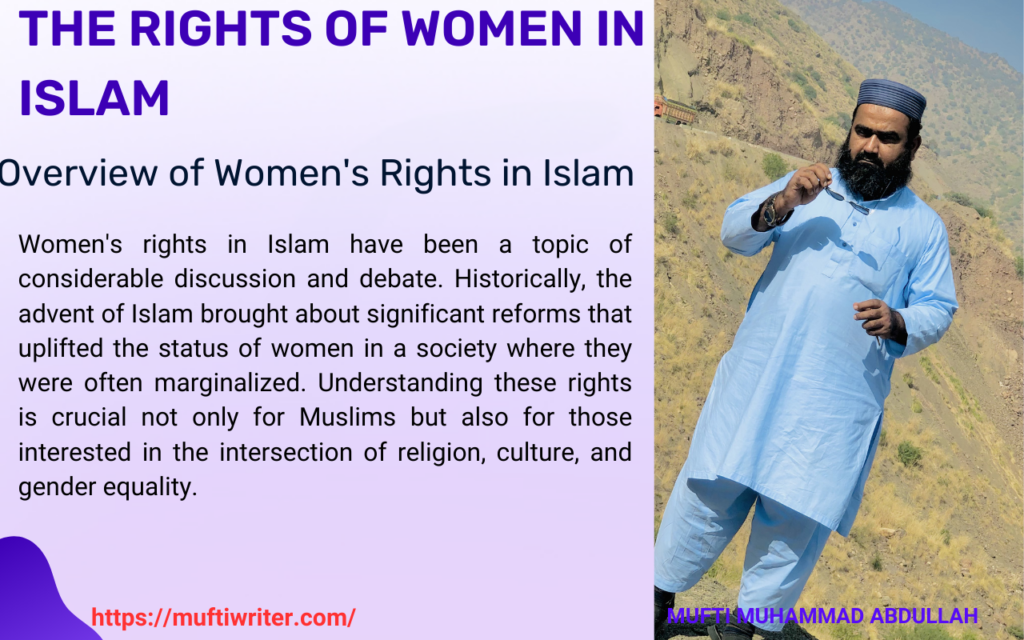
Outline
Introduction
- Overview of Women’s Rights in Islam
- Historical context
- importance of understanding these rights
- Objectives of the Article
- Clarify misconceptions
- Highlight the rights accorded to women
Historical Context
- Pre-Islamic Arabia
- Status of women before Islam
- Introduction of Islamic Reforms
- Key reforms introduced by Islam
Rights of Women in Islam
- Spiritual Rights
- Equality in religious duties and rewards
- Educational Rights
- Right to seek knowledge
- Economic Rights
- Right to own and manage property
- Legal Rights
- Access to justice and legal representation
- Social Rights
- Right to social respect and dignity
- Marriage and Family Rights
- Consent in marriage
- Right to a fair dowry (Mahr)
- Right to Work
- Conditions and contexts
Women’s Rights in Practice
- Women in Early Islamic History
- Notable figures and their contributions
- Contemporary Examples
- Modern examples of women’s rights in practice
Common Misconceptions
- Polygamy
- Context and limitations
- Veiling and Modesty
- Cultural vs. religious practices
- Inheritance Laws
- Explanation and rationale
Expert Insights
- Islamic Scholars on Women’s Rights
- Quotes and perspectives
- Women’s Rights Advocates
- Contributions and viewpoints
Comparative Analysis
- Comparison with Other Religions
- Women’s rights in Christianity and Judaism
- Global Perspective
- Women’s rights in secular vs. Islamic societies
Conclusion
- Summary of Key Points
- Recap of the main arguments
- Call to Action
- Encouragement for further research and understanding
Article
Introduction
Overview of Women’s Rights in Islam
Women’s rights in Islam have been a topic of considerable discussion and debate. Historically, the advent of Islam brought about significant reforms that uplifted the status of women in a society where they were often marginalized. Understanding these rights is crucial not only for Muslims but also for those interested in the intersection of religion, culture, and gender equality.
Objective of the Article
This article aims to clarify common misconceptions about women’s rights in Islam and highlight the comprehensive rights that are accorded to women. By exploring these rights through a historical and contemporary lens, we hope to provide a balanced and well-rounded perspective.
Historical Context
Pre-Islamic Arabia
Before the advent of Islam, women in Arabian society were generally considered inferior to men. They had limited rights, especially in matters of marriage, inheritance, and education. Female infanticide was a prevalent practice, and women were often treated as property.
Introduction of Islamic Reforms
Islam introduced several key reforms that significantly improved the status of women. The Quran and Hadith emphasized the spiritual, economic, legal, and social rights of women, advocating for their dignity and respect in all aspects of life.
Rights of Women in Islam
Spiritual Rights
In Islam, men and women are considered equal in terms of their spiritual obligations and rewards. Both are required to perform the five pillars of Islam: faith (Shahada), prayer (Salat), fasting (Sawm), charity (Zakat), and pilgrimage (Hajj). The Quran explicitly states that men and women will be rewarded equally for their good deeds.
Educational Rights
The pursuit of knowledge is a fundamental aspect of Islam, and this extends to both men and women. The Prophet Muhammad emphasized the importance of education for all Muslims, stating, “Seeking knowledge is an obligation upon every Muslim.” Women have the right to seek education and contribute to the intellectual and spiritual growth of the community.
Economic Rights
Islam grants women the right to own, inherit, and manage property independently. Women can engage in business and trade, and their financial independence is protected by Islamic law. The concept of the dowry (Mahr) in marriage further reinforces a woman’s economic rights, as it is a mandatory gift from the husband to the wife.
Legal Rights
Women in Islam have the right to seek justice and have legal representation. Islamic law provides specific protections for women, ensuring their rights are upheld in matters such as marriage, divorce, and inheritance. Women can also serve as witnesses and participate in legal proceedings.
Social Rights
Islam emphasizes the dignity and respect of women in society. Women are to be treated with kindness and respect, and any form of abuse or mistreatment is strictly prohibited. The Quran and Hadith advocate for the fair and honorable treatment of women in all aspects of life.
Marriage and Family Rights
Islamic law requires the consent of both parties in a marriage. A woman has the right to accept or reject a marriage proposal and is entitled to a fair dowry (Mahr). In family life, women have the right to be treated with kindness and justice by their husbands. The responsibilities within marriage are shared, and the well-being of the family is a collective duty.
Right to Work
Women have the right to work and earn a livelihood, provided it is within the framework of Islamic principles. The type of work and working conditions should respect the modesty and dignity of women. Many Muslim women today are engaged in various professions, contributing significantly to their communities and economies.
Women’s Rights in Practice
Women in Early Islamic History
Throughout Islamic history, women have played vital roles in various fields. Figures like Khadijah bint Khuwaylid, the Prophet Muhammad’s first wife, who was a successful businesswoman, and Aisha bint Abi Bakr, a renowned scholar, highlight the active participation of women in early Islamic society.
Contemporary Examples
In contemporary times, women in many Muslim-majority countries hold prominent positions in politics, education, and business. Examples include Nobel laureate Malala Yousafzai, known for her advocacy for girls’ education, and Sheikh Hasina, the Prime Minister of Bangladesh.
Common Misconceptions
Polygamy
Polygamy is often misunderstood as a widespread and unregulated practice in Islam. However, the Quran permits polygamy under strict conditions, emphasizing fairness and justice. It is not an obligation but a permissible act with significant restrictions.
Veiling and Modesty
The practice of veiling and modesty is another area of misconception. While modesty in dress is prescribed in Islam, the extent and style of veiling vary across cultures. It is important to differentiate between cultural practices and religious obligations.
Inheritance Laws
Islamic inheritance laws are often criticized for being unequal. However, these laws are part of a broader framework that considers the financial responsibilities of men and women. Men are generally required to provide for their families, which justifies the different shares.
Expert Insights
Islamic Scholars on Women’s Rights
Many Islamic scholars have elaborated on the rights of women in Islam. Scholar Dr. Tariq Ramadan emphasizes that Islam advocates for gender equality and the empowerment of women within an ethical framework.
Women’s Rights Advocates
Women’s rights advocates within the Muslim community have played crucial roles in promoting and protecting these rights. Figures like Dr. Ingrid Mattson and Anse Tamara Gray work tirelessly to educate and empower Muslim women.
Comparative Analysis
Comparison with Other Religions
When comparing women’s rights in Islam with other religions, it is evident that many faiths have had to evolve over time to address gender equality. Islam’s early reforms in women’s rights were revolutionary compared to the contemporary practices of other religions.
Global Perspective
In secular societies, women’s rights are often framed within a human rights context. Islamic societies, while upholding many of these rights, do so within a religious framework that emphasizes moral and ethical considerations.
Conclusion
Summary of Key Points
The rights of women in Islam are comprehensive and multifaceted, encompassing spiritual, educational, economic, legal, and social aspects. These rights, introduced by Islam over 1400 years ago, continue to provide a robust framework for gender equality.
Call to Action
For a deeper understanding of women’s rights in Islam, it is essential to engage with primary sources such as the Quran and Hadith, and to seek knowledge from credible scholars. Promoting these rights requires continuous education and advocacy within and outside the Muslim community.



Pingback: اسلام میں خواتین کے حقوق – دین اسلام سیکھیں